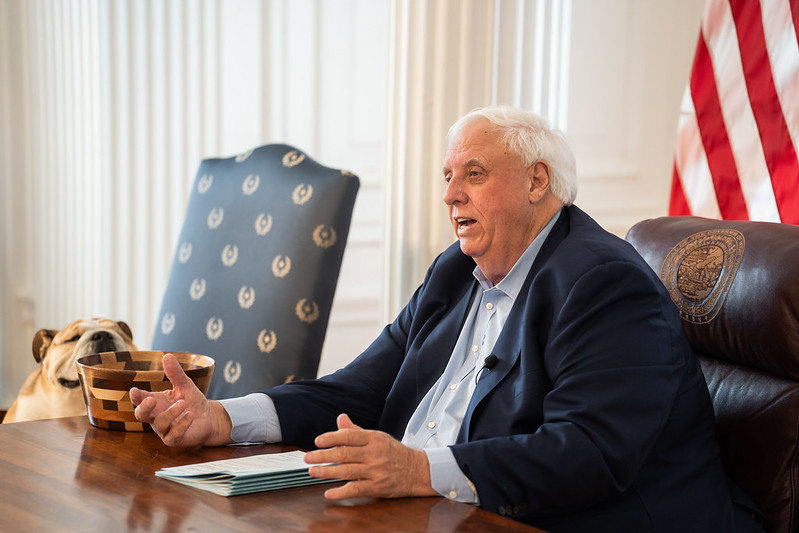Gov. Jim Justice still plans to call legislators in for special session, but it’s still not clear when that will be or what the agenda might include.

Justice has consistently said he wants lawmakers to return for higher funding of state human services programs. And lawmakers have priorities to set for surplus spending that was left undetermined at the end of the regular session. More issues could include state support for child care.
But all that still seems up in the air.
At one point Justice had expressed urgency to settle some lingering financial issues in April. Then there was more serious discussion of aligning a special session with legislative interim meetings already scheduled for May 19-21.

Larry Pack, the state revenue secretary and senior adviser to the governor, could only say today that he anticipates a special session before the end of the fiscal year, June 30.
“We hope to be able to have the special session in May when interims are in, but there’s a good possibility that it may be pushed off a week or two. But we absolutely — everybody’s working together with the understanding that we’ll get this done well before June 30,” Pack said on MetroNews’ “Talkline.”
The big issue is West Virginia’s level of human services funding. Justice, last month, referred to “a dog’s mess” — saying a budget that passed during the regular legislative session left human services funding far short of where it needs to be.
Yet lawmakers last month focused time and questions on whether West Virginia in recent years spent millions of dollars less than was allocated for waiver programs meant to support people with disabilities, instead shifting dollars to expenses like covid-19 testing or contract nursing. Those questions remain as some lawmakers continue to assess what level of funding is appropriate.
A second financial matter for lawmakers to resolve is surplus spending priorities. The regular session ended with passage of “a skinny budget” that left many surplus spending possibilities undone because of other uncertainties.
One of the big questions was whether West Virginia would be on the hook for millions of dollars of federal covid relief for school systems. Within the past couple of weeks, though, federal officials gave official word that West Virginia has been approved for a waiver by showing good-faith financial support for education.
Searching for special session specifics
Even though weeks have passed, representatives of the executive branch and lawmakers are still working on agreements for some of those priorities. They don’t want to enter special session with uncertainty lingering, opening potential to drag on and on.
Pack said $500 million to $600 million in surplus spending has yet to be allocated. There’s also an amount of about $300 million that could still be considered for general revenue spending for the coming fiscal year.
“So we have a lot of work to do to determine how we’re going to allocate that money and what that’s going to look like,” Pack said. “We’re having discussions — the Governor’s Office and Governor Justice having discussion with the Legislature, trying to reach agreement on how we go about it, how we approach it.
“They’ve been very positive, but we’re not really at the point yet to say when we’re going to have this session or what’s going to be on it.”
Human services funding
Governor Justice has continued to focus on state allocations to assist disabled and vulnerable residents. The level of state funding for intellectual and developmental disabilities waivers, commonly called IDD waivers, has been at the center of a simmering budget dispute among lawmakers and the governor.
A large crowd of families gathered at the Capitol last month to push lawmakers to revisit a 10% cut to the program that was approved at the end of the legislative session.
More broadly, the progressive West Virginia Center on Budget & Policy think tank, in a budget analysis, described deep cuts to the state’s Medicaid funding. The budget for the coming fiscal year leaves Medicaid with a shortfall of about $147 million, according to the center’s analysis.
Justice, at a news briefing this week, stood by his view that human services funding needs to be a priority.
“The first thing we do is we need to get our funding back in place for DHHR,” Justice said, referring to the name of the former Department of Health and Human Resources, which has been split now into three separate agencies.
“We’ve got our most needy and most dependent people, we just cut their legs out from under them. I don’t think it will be catastrophic unless we can’t put the funding back in. But surely to goodness — we’ve already got the funding; there was no need to do it.”
Lawmakers weigh in
Lawmakers asked a range of questions about the state’s level of funding for human services last month during an interim meeting of the Joint Standing Committee on Health.
Their questions focused on why in some recent years money that was allocated to IDD waivers wound up being shifted to other costs and whether state rates for care providers are anywhere near adequate. Legislative leaders have also noted that more specific line items for the human services budget might require some time to fully assess.

“For the people who have been scared to death over the IDD waiver, can I just say no one has lost one penny of their IDD waiver funds. That is not on the table,” said Senator Rollan Roberts, R-Raleigh, speaking on “Radio Roundtable” on Beckley’s WJLS AM.
“There’s just a lot of things in this clearing up the old DHHR that is on the table, but some people found it advantageous to scare IDD waiver people to death. And I think that is so grievous, sad. No one has lost a penny; they’re not going to lose a penny. We’re trying to figure out all of these different categories because the money was not spent the way it was appropriated.”
Referring to the complexity of budgeting for a multi-billion dollar agency that has been split three ways, Roberts concluded, “We’re going to be talking about it three years from now. This is not an easy fix.”

Delegate Mike Pushkin, D-Kanawha, expressed concern this week that state leaders aren’t getting a jump on those questions. Pushkin, who is also chairman of the state Democratic Party, said he was dismayed by the possibility that a special session to shore up human services funding and other matters could be pushed off until summer.
“There have been talks of a special session in May and now we’re starting to hear different dates, which is troubling,” Pushkin said on “The Dave Allen Show” on WCHS Radio.
“I hope the governor and the legislature, my friends on the other side of the aisle. can get it together soon for the sake of a lot of people who are going through a lot of uncertainty right now, especially those in the IDD waiver program. We need to get it together, the legislature and the governor’s office, and get in there during the interims and fix this mess that was created at the end of the interims.”

